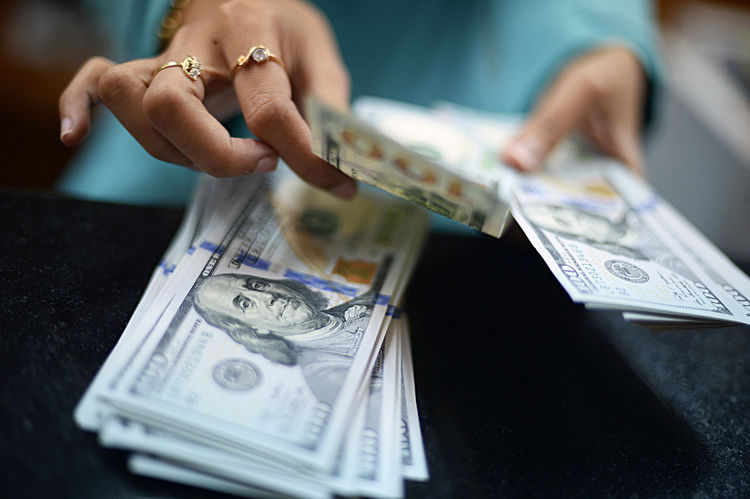The dollar strengthened versus all of its major peers as hawkish comments from a Federal Reserve official boosted the likelihood of a U.S. interest-rate increase this year. The yen’s retreat was spurred by prospects for further monetary easing in Japan, while oil dropped with gold.
Dollar index rose to a one-week high after Fed Vice Chairman Stanley Fischer said Sunday the U.S. economy is already close to meeting the central bank’s goals and that growth will pick up. The yen fell for a second day and Japanese stocks advanced after Bank of Japan Governor Haruhiko Kuroda flagged the possibility that the authority’s unprecedented monetary stimulus will be added to in September. Elsewhere in Asia, most shares declined as oil fell to about $48 a barrel. Silver led losses among precious metals.
Global markets have been buffeted by comments from Fed officials flagging the possibility of higher borrowing costs as early as next month, even though minutes of the central bank’s last meeting struck a more dovish tone. The focus will shift to Janet Yellen’s speech this week in Jackson Hole, Wyoming, where top global central bankers will gather for a meeting. Futures traders on Friday assigned a 22 percent probability to a September rate increase by the Fed, up from 16 percent a week earlier.
“Janet Yellen’s speech on Friday will have the biggest impact on short-term market moves, especially if she follows in Stanley Fischer’s relatively hawkish tone,” said Angus Nicholson, a market analyst at IG Ltd. “A week of talking up the U.S. dollar will be good for U.S. financial stocks that would benefit from a rate rise and some of that positivity could spread over into financials globally.”
Currencies
Dollar Spot Index rose 0.4 percent as of 11:16 a.m. Tokyo time, after losing ground in each of the last two weeks. South Korea’s won fell 0.8 percent versus the greenback and New Zealand’s dollar lost 0.7 percent, the biggest declines among 16 major currencies.
“We expect the dollar to consolidate this week with a modest upside bias,” said Elias Haddad, a senior currency strategist at Commonwealth Bank of Australia in Sydney. “There is room for U.S. interest-rate expectations to adjust a bit higher this week.”
The yen dropped 0.5 percent to 100.73 per dollar. Kuroda told the Sankei newspaper that the BOJ is conducting a comprehensive review of Japan’s economy and finances and said there is “sufficient chance” of more easing at next month’s policy meeting. Softer July inflation data this Friday may raise odds for more aggressive BOJ easing, Haddad said.
Forwards on India’s rupee were little changed after India named Urjit Patel to take over from Raghuram Rajan as central bank governor from Sept. 4.
Stocks
Japan’s Topix index added 0.5 percent as the yen’s decline boosted exporters including Toyota Motor Corp., which was headed for its highest close since March.
About three stocks fell for every two that rose on the MSCI Asia Pacific excluding Japan Index, with raw-materials producers leading losses among 10 industry groups. South Korea’s Kospi index slipped from a 13-month high as foreign investors pulled funds from the securities for the first time in a week, while Taiwan’s benchmark was set for its lowest close in a month. Hong Kong’s Hang Seng Index rose 0.1 percent, after retreating from a nine-month high on Friday.
Futures for the S&P 500 Index fell 0.1 percent after the gauge ended last week within 0.3 percent of an all-time high. Pfizer Inc. is close to an agreement to buy Medivation Inc. for about $14 billion and a deal may be announced as early as Monday, according to people familiar with the situation.
Commodities
Crude oil declined 1.1 percent to $48.01 a barrel in New York after Iraq, OPEC’s second-biggest producer, said it will boost exports by about 5 percent amid a glut of supply. The price jumped 9.1 percent last week on speculation that OPEC talks next month could lead to an output freeze. U.S. drillers added rigs for an eighth week, the longest run since April 2014, Baker Hughes Inc. data show.
Silver dropped as much as 3 percent to a seven-week low, while gold was down 0.6 percent amid the dollar’s advance. Silver has rallied 37 percent this year while gold jumped 26 percent as the Fed refrained from tightening and other central banks embraced negative rates, benefiting bullion which doesn’t pay interest.
Bonds
U.S. Treasuries due in a decade fell, pushing their yield up by one basis point to 1.59 percent. The yield could climb toward 1.70 percent if Yellen’s remarks are along the lines of those made by Fischer when she delivers her address on Friday, according to Su-Lin Ong, a senior economist at Royal Bank of Canada in Sydney.
“The market is clearly susceptible to Yellen making similar comments in Jackson Hole,” Ong said. “The most recent lot of Fed speakers — and these are key speakers — have signaled that the market should be putting a greater weight on the risk of a move before year-end.”
Australia’s 10-year bond yield increased by five basis points to 1.91 percent and Japan’s rose by one basis point to minus 0.08 percent.

 Billionaire Watch3 weeks ago
Billionaire Watch3 weeks ago
 Startups4 weeks ago
Startups4 weeks ago
 News4 weeks ago
News4 weeks ago
 News4 weeks ago
News4 weeks ago
 Bitcoin4 weeks ago
Bitcoin4 weeks ago
 Naira4 weeks ago
Naira4 weeks ago
 Forex3 weeks ago
Forex3 weeks ago
 Treasury Bills4 weeks ago
Treasury Bills4 weeks ago


























